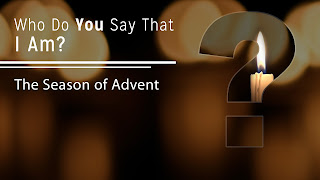FIRST WEEK OF ADVENT | EMMANUEL
DEVOTIONAL READING
Matthew 1:18-24; John 14:16-17; I Peter 1:1-2;
Hebrews 11:13-16
O come, O come, Emmanuel, and ransom captive Israel,
that mourns in lonely exile here, until the Son of God appear.
As mentioned in the Introduction, we are using the art and theology of the hymn O Come, O Come, Emmanuel to help us unpack some of the prophetic answers and titles to Jesus' question in Mark 8:29, "Who do you say that I am?" For some brief historical background, this hymn finds its origin in the medieval church of the twelfth century and possibly earlier. It began as a series of Antiphons - short statements sung during the Advent season. Each of the Antiphons greets the Savior with one of the many titles ascribed to him in the Scriptures: Emmanuel, Lord of Might, Rod of Jesse, Dayspring, Key of David.
The first prophetic title is Emmanuel, which means "God is with us." This promise, first spoken through the prophet Isaiah, surely brought encouragement and hope to God's people during their many periods of trial and even exile. This promise finds its ultimate fulfillment, however, in the person of Jesus. The first century disciples were able to walk, talk, and fellowship with Jesus. As his disciples today, Jesus does not physically walk with us, but he is present with us spiritually through the person of the Holy Spirit. In John 14:16-17, Jesus assures us that he will give us "another Advocate, who will never leave you. He is the Holy Spirit, who leads into all truth," and who "will be in you."
Through the various means of grace (e.g., Word, sacrament, prayer) Jesus is present with us through the Holy Spirit. He leads us into truth and walks in relationship with us. Still, like the Israelites who mourned in "lonely exile," we, too, long to be fully with Jesus. We, too, live as "exiles" and "foreigners" (I Peter 1:1). This description is meant to remind us that this present world is not our true home. We are looking for a "better place, a heavenly homeland" (Hebrews 11:16). Until that final day, we rest in the hope of the present reality and promise that God is with us.
QUESTIONS FOR REFLECTION
1. Read Matthew 1:18-24. What does Emmanuel
(God is with us) mean to you?
2. Read John 14:16-17. Who is this other "Advocate" that Jesus refers to in vs. 16? How does the person of the Holy Spirit fulfill the promise that "God is with us"?
3. Read I Peter 1:1-2. The lyric "that mourns in lonely exile here" speaks to Israel's sadness while in exile and captivity. How are we like "exiles" as we await Christ's return?
4. Read Hebrews 11:13-16. Do you long for heaven, your true home? How does the hope of heaven encourage you in your daily life?
Matthew 1:18-24; John 14:16-17; I Peter 1:1-2;
Hebrews 11:13-16
O come, O come, Emmanuel, and ransom captive Israel,
that mourns in lonely exile here, until the Son of God appear.
As mentioned in the Introduction, we are using the art and theology of the hymn O Come, O Come, Emmanuel to help us unpack some of the prophetic answers and titles to Jesus' question in Mark 8:29, "Who do you say that I am?" For some brief historical background, this hymn finds its origin in the medieval church of the twelfth century and possibly earlier. It began as a series of Antiphons - short statements sung during the Advent season. Each of the Antiphons greets the Savior with one of the many titles ascribed to him in the Scriptures: Emmanuel, Lord of Might, Rod of Jesse, Dayspring, Key of David.
The first prophetic title is Emmanuel, which means "God is with us." This promise, first spoken through the prophet Isaiah, surely brought encouragement and hope to God's people during their many periods of trial and even exile. This promise finds its ultimate fulfillment, however, in the person of Jesus. The first century disciples were able to walk, talk, and fellowship with Jesus. As his disciples today, Jesus does not physically walk with us, but he is present with us spiritually through the person of the Holy Spirit. In John 14:16-17, Jesus assures us that he will give us "another Advocate, who will never leave you. He is the Holy Spirit, who leads into all truth," and who "will be in you."
Through the various means of grace (e.g., Word, sacrament, prayer) Jesus is present with us through the Holy Spirit. He leads us into truth and walks in relationship with us. Still, like the Israelites who mourned in "lonely exile," we, too, long to be fully with Jesus. We, too, live as "exiles" and "foreigners" (I Peter 1:1). This description is meant to remind us that this present world is not our true home. We are looking for a "better place, a heavenly homeland" (Hebrews 11:16). Until that final day, we rest in the hope of the present reality and promise that God is with us.
QUESTIONS FOR REFLECTION
1. Read Matthew 1:18-24. What does Emmanuel
(God is with us) mean to you?
2. Read John 14:16-17. Who is this other "Advocate" that Jesus refers to in vs. 16? How does the person of the Holy Spirit fulfill the promise that "God is with us"?
3. Read I Peter 1:1-2. The lyric "that mourns in lonely exile here" speaks to Israel's sadness while in exile and captivity. How are we like "exiles" as we await Christ's return?
4. Read Hebrews 11:13-16. Do you long for heaven, your true home? How does the hope of heaven encourage you in your daily life?




Comments